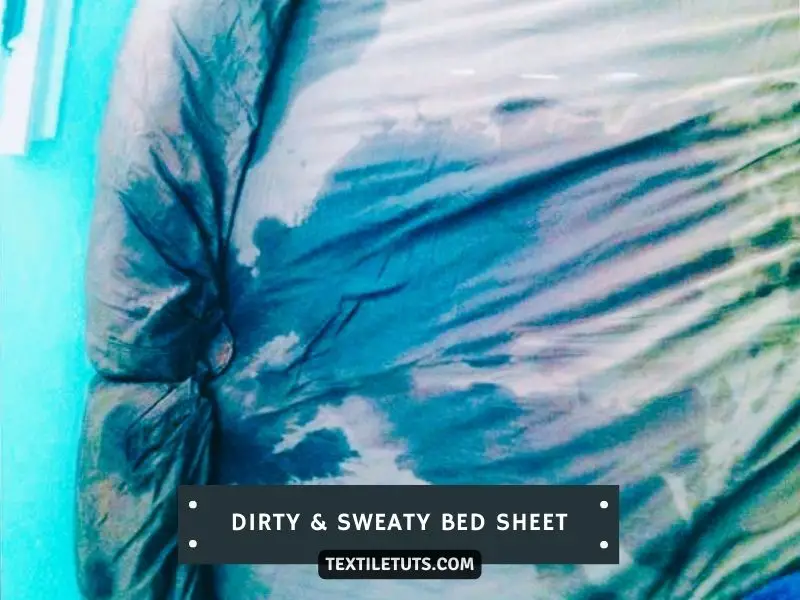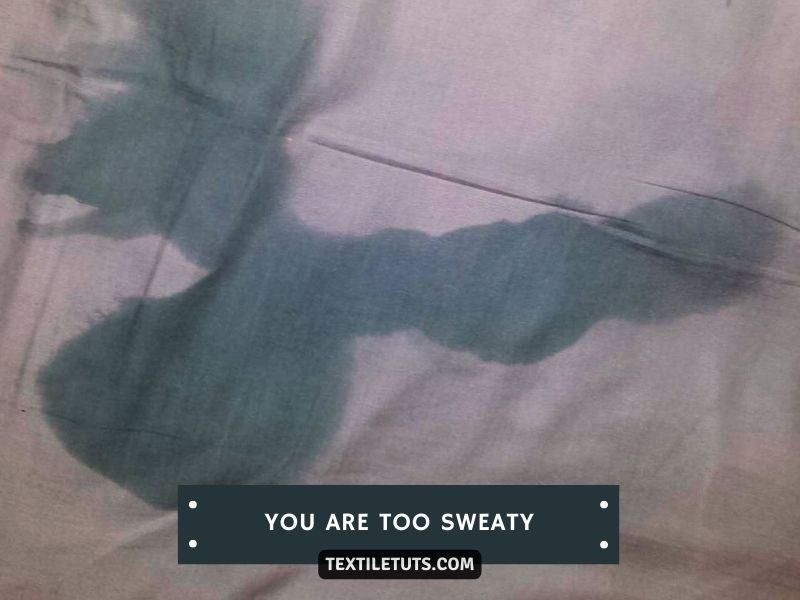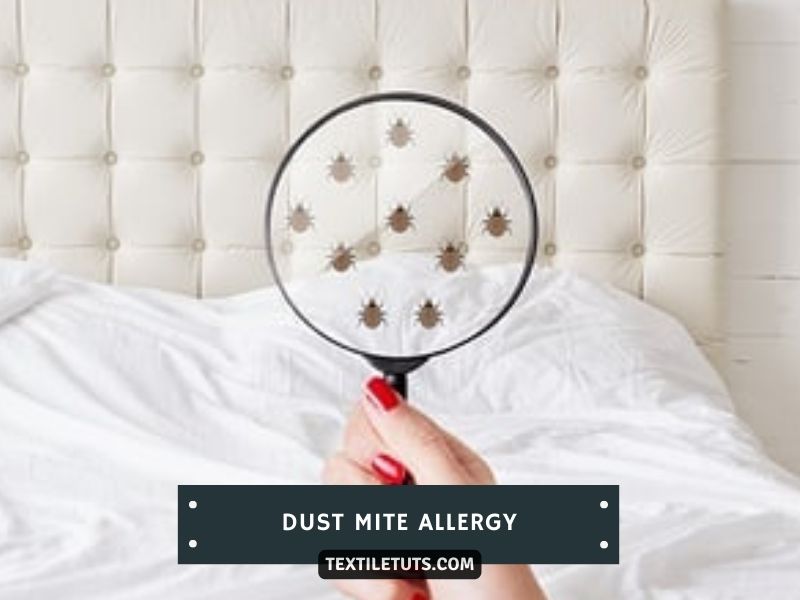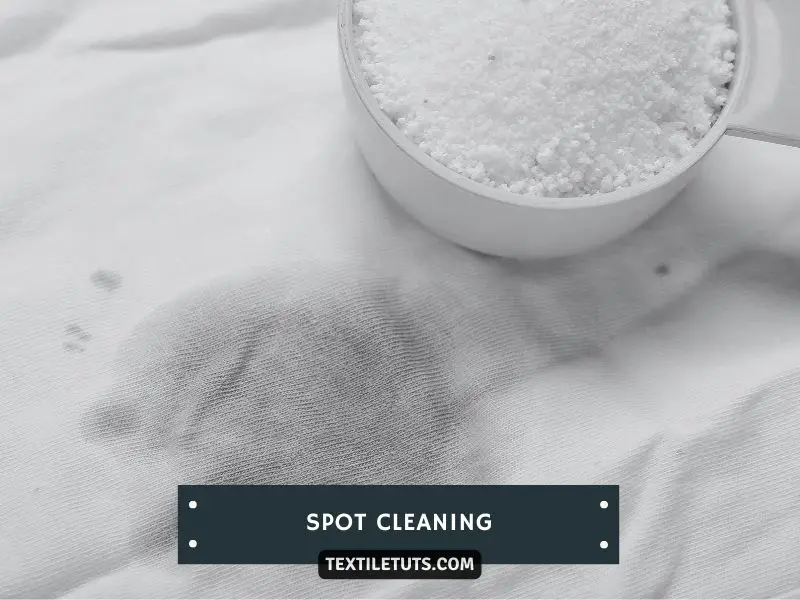Why Do My Sheets Feel Sticky?
You may have experienced this before – you hop into bed, snuggle under the covers, and suddenly your sheets feel sticky. It’s a weird sensation, and you may be wondering why it happens. Your sheets might feel sticky for a few reasons.
One reason may be that you are not washing your sheets often enough. If you do not wash your sheets often enough, sweat and body oils can build up, making your sheets feel sticky.
In this blog post, I’ll explain the different reasons why this occurs and what you can do to prevent bad smelling and stickiness of your bed sheet. So read on to find out!
Reasons Behind a Sticky Bed Sheet
We’ve all been there – you wake up in the middle of the night, hot and sticky, feeling like you’re stuck to your sheets. It’s an unpleasant feeling and one that can be hard to shake. So here are the reasons why your bed sheet might feel sticky.
Lack of Washing

The first possibility is that you’re not washing your sheets often enough. Even if you don’t think they’re dirty, sweat and skin cells can build up on your sheets and make them feel sticky. Aim to wash your sheets at least once a week in hot water to remove any build-up.
Detergent Residue
Maybe you are using a detergent or fabric softener that has terrible quality. Using the wrong detergent or fabric softener can leave a residue on your sheets after washing that makes them feel sticky.
Humid Air and Environment
It could be the humidity in the air. When the air is more humid, your skin feels sticky and sweaty. Fabric in the bed sheet also absorbs moisture from the air. Making your sheet damp and smell musty.
Fabric Quality
If your bed sheets are made of a material that doesn’t breathe well, this can cause you to sweat more at night and make your bed sheets feel sticky. You might be sleeping in a synthetic fabric like polyester. These fabrics tend to hold onto sweat and body heat, making you feel sticky. Instead, try switching to bed sheets made of a breathable material like cotton.
You Are Too Sweaty

One possibility is that you’re sweating during the night. This is especially common in hot weather or if you have a fever. When your body temperature rises, you may sweat more, making your bed sheets feel sticky. Also, when you are dehydrated, when your body lacks water, your sweat glands work overtime to try to compensate, leading to more sweat and stickiness.
If you think this might be the case, try sleeping with a light blanket or sheet. This will help to absorb any sweat, so it doesn’t make your bed sheets feel sticky.
You Have a Dust Mite Allergy

Dust mites are tiny creatures that thrive in warm, humid environments – like your bed. If you’re allergic to dust mites, you may experience a runny nose, itchy eyes, and difficulty breathing. You may also notice that your sheets feel sticky.
Old Bed Sheet
When your sheets are old and need to be replaced, they can make you feel weird. If they’re more than a few years old, they might not be as absorbent as they used to be, making them feel sticky.
How Do You Clean Sticky Bed Sheets?
It’s not uncommon for bed sheets to become sticky, especially if you sweat during the night or live in a humid climate. However, there are a few simple ways to clean your bed sheets and remove the sticky residue.
Identify the Reason for the Stickiness
The first step is to identify the source of the stickiness. For example, if your sheets are covered in sweat or body oil, you’ll need to launder them with detergent. If spills or other accidents cause stickiness, you can spot clean the affected area with a mild soap or detergent.
New sheets also cause stickiness; you can try washing them in vinegar or baking soda to remove the finish. If the stickiness is due to old sheets, soak them in hot water with detergent or use a stain remover.
Clean Using Detergent
Once you’ve determined the cause of the stickiness, you can begin cleaning your bed sheets. First, wash them in warm water with a mild detergent. But before proceeding with the cleaning process, look at the care label on your bed sheets. If they are machine-washable, you can start by washing them on a gentle cycle in warm water.
If your bed sheets are not machine-washable, you can try spot-cleaning them with a damp cloth. If the sticky feeling persists, you can try soaking your bed sheets in a mixture of warm water and vinegar.
Spot Cleaning

Soak a clean cloth in warm water and mild soap or detergent. Gently scrub the sticky area until it comes clean. Rinse the area with clean water and allow the sheets to air dry.
Dry Sheet Under the Sun
If your sheets still feel sticky after you have washed them, try drying them in the sun. The sunlight will help to remove any odor and bacteria that may be on your sheets.
Replace the Sheet
After following these tips, if the stickiness doesn’t go away and they are over a year old, then it’s time to replace them. Sticky sheets are not only uncomfortable, but they can also be a breeding ground for bacteria. So don’t wait; get new sheets.
How Can You Prevent Stickiness Coming Back?
Most people probably don’t think much about their bed sheets. But if you suffer from night sweats or you’re a hot sleeper, you know that sticky bed sheets can be a real pain. Stickiness coming back in bed sheets can be prevented by following a few simple tips:
Wash Your Bed Sheets Regularly
Washing your bed sheets regularly is the best way to prevent them from becoming sticky. If you wash them once a week, you’ll always have fresh, clean bed sheets to sleep on.
Keep the Bed in Well-Ventilated Area
Try to keep your bedroom cool and well-ventilated. This will help reduce the humidity in the air and keep you from sweating much.
Plus, a bed sheet that is too big or too loose is more likely to become sticky than one that is a tight fit. This is because the loose sheet can bunch up and absorb sweat and other moisture, whereas the tight-fitting one will stay smooth and dry.
Buy Cotton Bed Sheets
Switch to natural fabrics like cotton for your bedding. They are more breathable and won’t hold onto sweat and heat like synthetic fabrics. In addition, these are less likely to absorb moisture than synthetic fabrics. This means that a cotton sheet is less likely to become sticky than those made from polyester or other synthetic materials.
Also, a bed sheet with a smooth finish is less likely to absorb moisture than a bed sheet with a rough finish. This is because the even surface repels moisture rather than absorbing it.
Use a Dehumidifier
If you live in a humid climate or have night sweats, a dehumidifier can help keep your bed sheets dry. By removing excess moisture from the air, these machines will help to prevent your bed sheets from becoming sticky.
Use the Right Detergent
Some detergents can leave behind a residue that makes sheets feel sticky. Look for a detergent that’s specifically designed for bedding or sensitive skin. Also, fabric softener not only makes sheets feel softer but can also help prevent that sticky feeling.
Mattress Protector
A mattress protector is a thin, often waterproof, sheet that you can put over your mattress. This will help to keep your mattress clean and dry, and it will also help to prevent your bed sheets from becoming sticky.
High Thread Count Fabric
The higher the thread count, the less likely your bed sheets will become sticky. In addition, a higher thread count means that the fabric is tighter woven, which makes it less likely to absorb sweat and other moisture. So purchase your bed sheet and pillowcase with a tight weave pattern.
Moisture-Wicking Finish Sheets
A bed sheet with a moisture-wicking finish is treated with a special finish that helps to repel moisture. This means they are less likely to become sticky, even if you sweat at night.
Hang Your Sheets to Dry
The dryer’s heat can cause your sheets to become even stickier. If possible, hang your sheets to dry instead of using a dryer. Don’t over-dry your sheets; the fibers can become stiff and uncomfortable if you let them dry for too long. Just take them out of the dryer when they’re still slightly damp.
Store Them Properly
Use a cool, dry place when you’re storing bed sheets. They’re more likely to become sticky if they’re stored in a humid environment.
Dry Them Properly
Make sure you’re drying your sheets properly. If you put them on your bed, they’re more likely to feel sticky if they’re still damp. Instead, dry them on the highest heat setting on your dryer, and ensure they’re completely dry before putting them back on your bed.
What Are the Easy Ways to Remove Lint from the Sheets?
Clean sheets can mean more than just fresh-smelling linen. They can also mean lint-free sheets! If you’re looking for easy ways to remove lint from your sheets, here are a few tips to get you started.
Use a Lint Roller
This is probably the easiest way to remove lint from your sheets. All you need to do is roll the lint roller over the surface of your sheets, and the adhesive will pick up the lint.
Lint Removing Brush
You can try using a lint brush. These brushes are specifically designed to remove lint from fabric. Just brush the sheets with the lint brush, and the lint will come right off. If you’re dealing with additional issues like uneven coloring, you might want to explore the fix blotchy fabric dye steps to restore a uniform appearance. Combining proper fabric maintenance with dye correction techniques can help keep your sheets looking fresh and vibrant.
Adhesive Tape
This method is similar to using a lint roller, but you’ll need to use a piece of tape instead. Simply adhere the piece of tape to the lint-covered area of your sheets and then peel it off. The lint should come off with the tape.
Damp Cloth
If you don’t have a lint roller or tape on hand, you can use a damp cloth to remove lint from your sheets. Just dampen a corner of the fabric and then rub it over the lint-covered area. The lint should come right off.
Use an Iron
It is more time-consuming, but it’s effective. Lay a clean towel over the lint-covered area of your sheets. Then, set your iron to the steam setting and hold it over the towel for a few seconds. The heat and steam from the iron will cause the lint to loosen, and it should come right off.
Vacuum Cleaner
Use a vacuum cleaner with a hose attachment. It is the easiest way to remove lint from your sheets. Vacuum the lint-covered area of your sheets with the attachment. The vacuum will pick up all of the lint and leave your sheets looking clean and fresh.
Final Verdict
Your sheets are most likely to get oily or greasy. The residue build-up in your sheets can be a result of many different things. This can make your sheets feel sticky, even if they’re clean. That can get worse if you’re not washing them correctly.
When you don’t wash your sheets regularly, the sweat, skin cells, and oil from your body build up on the fabric.
To prevent this, make sure to wash your sheets at least once a week in hot water. You can also add a cup of vinegar to the wash cycle to help remove any build-up on the fabric. Try switching to a different detergent or washing your sheets in a different way.

